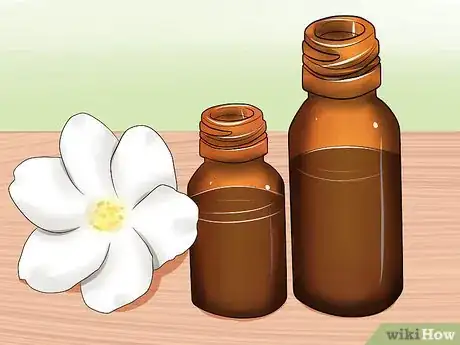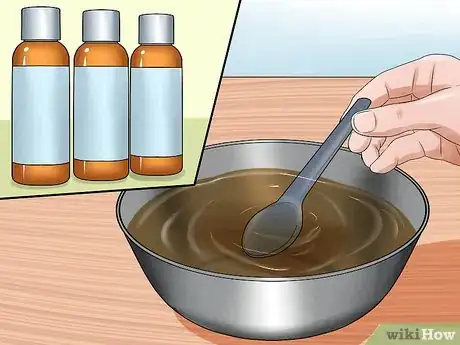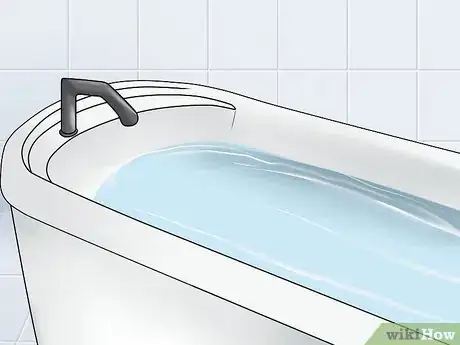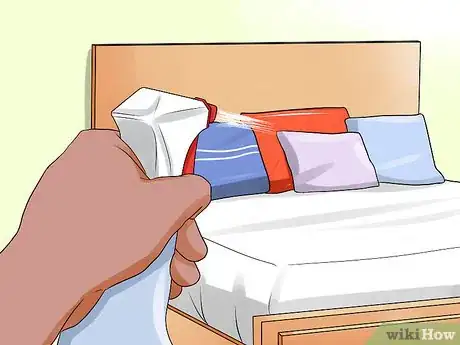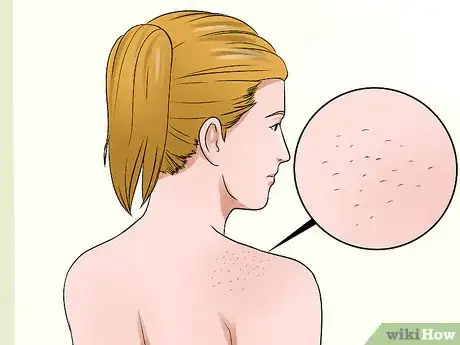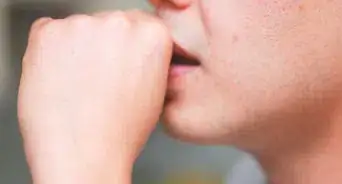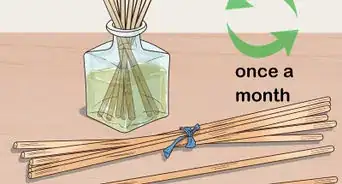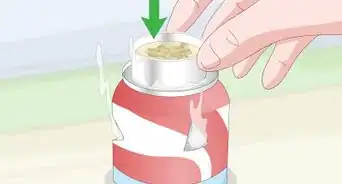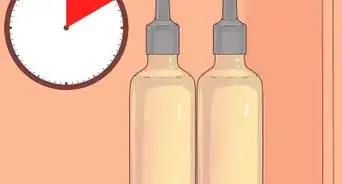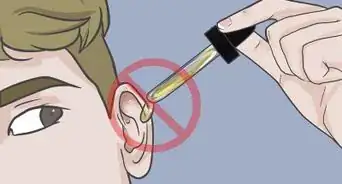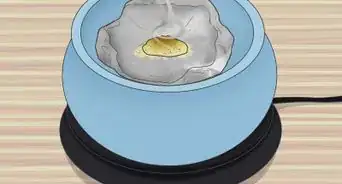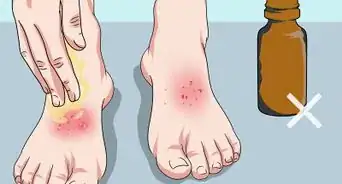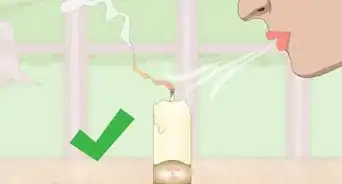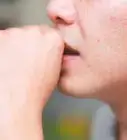This article was co-authored by Renee Hughes. Renee Hughes is a Certified Professional Aromatherapist and the CEO of The Aromaspecialists. With more than seven years of experience, she specializes in teaching others how to use aromatherapy and become certified aromatherapists. Renee received her training from The New Eden School of Natural Health and Herbal Studies. She is also a Level 2 National Association for Holistic Aromatherapy (NAHA) Certified Professional Aromatherapist and a NAHA Approved School Educator.
There are 21 references cited in this article, which can be found at the bottom of the page.
This article has been viewed 31,153 times.
Aromatherapy is the use of scent, usually with essential oils, to benefit your psychological and physical well-being.[1] Cultures across the globe have used aromatherapy for centuries to promote relaxation. It can also be a powerful way to help you relax. By figuring out the best aroma for you and enjoying different aromatherapy techniques, you can use aromatherapy to relax you.
Steps
Choosing the Right Essential Oils
-
1Choose the best essential oils for relaxing. Aromatherapy is generally delivered through essential oils, which are distilled from the leaves, stems, flowers, bark, or roots of specific plants.[2] There are a wide variety of essential oils that can help you relax. Choose one with an appealing scent to you or mix several for a personalized essential oil. Some of the best essential oils for relaxation are:
-
2Dilute essential oils with a carrier oil. Essential oils are very powerful and you should avoid using a “neat” or undiluted oil on your skin.[8] A carrier oil reduces the potency of an essential oil. It also moisturizes your skin.[9]
- Use a mild carrier oil. Some excellent options are coconut, olive, avocado, safflower, and almond oils.
- Mix seven to12 drops of essential oil to each fluid ounce of carrier oil, depending on how strong you want the aroma.[10] Don’t dilute your essential oil with water or other liquids. These won’t make the mixture mild enough to use on your skin.
- You can get a serious burn if you apply undiluted essential oils to your skin.[11]
Advertisement -
3Test the oil on your skin. Before using your essential oil, it’s important to check that the mixture doesn’t irritate your skin. Dab one to two drops of the oil on the inside of your elbow. If you don’t notice a reaction after 24 hours, you can use the essential oil to help you relax.[12]
Enjoying a Relaxing Aromatherapy Treatment
-
1Give yourself a massage. Massages are a great way to relax. Adding aromatherapy to your massage can help you relax even more. Make sure you’ve mixed the essential oil with a carrier oil and done a patch test before you start the massage.[13]
- Massage yourself lightly so you don’t stimulate your circulation. This could make it harder to relax.[14]
- A 2% essential oil dilution is great for massage oils.[15]
- Start at your feet and work towards your head in a pattern that you find relaxing. Target your wrists, feet, legs, or temples during the massage. These areas can help heighten your massage experience and relaxation.
-
2Create a spa experience. Warm baths are an excellent way to relax your body and mind. Create a comfortable and relaxing mood in your bathroom to heighten the effect of the aromatherapy bath. This spa-type experience can let your melt into a paradise of relaxation.
- Fill the tub with water that won’t burn your skin. Check the temperature with your hand or a thermometer. The best water temperature for a relaxing and safe bath is 37 and 39 degrees Celsius (98.6 to 102.2 degrees Fahrenheit).[16]
- Pour your oil mixture into the water. Consider holding it under the tap to distribute the oil mixture through the water.
- Dim the lights in the bathroom or light some candles. Burning aromatherapy candles or scent lamps can boost your relaxation.[17] You may want to put on some soft and soothing music.
-
3Melt into your bath. Let your thoughts wander as you soak in your aromatherapy bath. Using bath props and soaking for the optimal time can boost your relaxation session.
- Stay in the bath for 15 – 20 minutes. This can ensure the most relaxation benefits without drying out or damaging your skin.[18]
- Using bath props to heighten your relaxation. Try items such as pillows, flower petals, or a warm washcloth over your eyes.
- Avoid ingesting the bathwater or getting it in your eyes. This may make you sick or irritate your eyes.
- Seal in relaxation moisture by wrapping yourself in a warm towel after the bath.
-
4Spritz your linens. If you have sensitive skin and don’t want to apply aromatherapy directly to your skin, consider spritzing your linens, including bedding and towels. This can help you relax for a longer period of time without irritating your skin. [19]
- Get a clean spray bottle. Mix 30 – 40 drops of your chosen essential oil with 1.5 ounces of distilled water in the bottle. You can increase the number of essential oil drops if you want the scent to be stronger. The more drops of oil you use, the stronger that the scent will be.
- You only need to lightly mist your towels to get the benefits of essential oils. Dousing your towels may irritate your skin.
- Lavender oil is especially helpful for creating a calming environment and helping you sleep.[20]
- Cedarwood, frankincense, myrrh, patchouli, and Roman chamomile are other great essential oils for relaxation.[21]
-
5Diffuse your aromatherapy oil. Another great way to relax with aromatherapy is by diffusing the scent with candles, humidifiers, and scent diffusers. These delivery methods offer similar calming effects to baths or massages.
- Look for candles containing natural, pure fragrances. Choose a candle made of beeswax, soy or another vegetable-based wax. These are the best way to reap the relaxing benefits of aromatherapy by candle.[22] Light candles for 30 minutes to help the scent circulate for a relaxing environment.
- Disperse your chosen scent through the air with a scent diffuser. A humidifier or cold-air vaporizer will also diffuse the scent throughout your home.[23] Consider building your own diffuser by putting your oil mixture in a bowl of hot water.[24] Diffuse your oil for up to 15 minutes every hour. This provides optimal relaxation results.[25]
- Always be sure to clean out your scent diffuser to prevent any essential oil residue from building up.[26]
- Don't use more than 8 drops of essential oil in a scent diffuser at one time. Around 3-8 drops is a good range to follow.[27]
- Extinguish candles and scent diffusers any time you are not present. This can prevent fires.
-
6Watch for potential reactions. Most essential oils are safe for use, especially if you’ve done a patch test. In some cases, you may still have a bad reaction to your chosen aromatherapy treatment. Watch for the following signs of an allergic reaction and seek prompt medical attention:
Expert Q&A
-
QuestionHow do you blend aromatherapy oils for relaxation?
 Renee HughesRenee Hughes is a Certified Professional Aromatherapist and the CEO of The Aromaspecialists. With more than seven years of experience, she specializes in teaching others how to use aromatherapy and become certified aromatherapists. Renee received her training from The New Eden School of Natural Health and Herbal Studies. She is also a Level 2 National Association for Holistic Aromatherapy (NAHA) Certified Professional Aromatherapist and a NAHA Approved School Educator.
Renee HughesRenee Hughes is a Certified Professional Aromatherapist and the CEO of The Aromaspecialists. With more than seven years of experience, she specializes in teaching others how to use aromatherapy and become certified aromatherapists. Renee received her training from The New Eden School of Natural Health and Herbal Studies. She is also a Level 2 National Association for Holistic Aromatherapy (NAHA) Certified Professional Aromatherapist and a NAHA Approved School Educator.
Certified Professional Aromatherapist Pick 2-3 relaxing aromatherapy oils and blend them together to create a relaxing blend. See how you feel after you blend and use each combination to determine which mixture is most effective for your needs.
Pick 2-3 relaxing aromatherapy oils and blend them together to create a relaxing blend. See how you feel after you blend and use each combination to determine which mixture is most effective for your needs. -
QuestionWhich essential oils help with stress?
 Ritu Thakur, MARitu Thakur is a healthcare consultant in Delhi, India, with over 10 years of experience in Ayurveda, Naturopathy, Yoga, and Holistic Care. She received her Bachelor Degree in Medicine (BAMS) in 2009 from BU University, Bhopal followed by her Master's in Health Care in 2011 from Apollo Institute of Health Care Management, Hyderabad.
Ritu Thakur, MARitu Thakur is a healthcare consultant in Delhi, India, with over 10 years of experience in Ayurveda, Naturopathy, Yoga, and Holistic Care. She received her Bachelor Degree in Medicine (BAMS) in 2009 from BU University, Bhopal followed by her Master's in Health Care in 2011 from Apollo Institute of Health Care Management, Hyderabad.
Natural Health Care Professional Some of the most effective essential oils for stress are ylang-ylang, lavender, clary sage, bergamot, and neroli.
Some of the most effective essential oils for stress are ylang-ylang, lavender, clary sage, bergamot, and neroli. -
QuestionHow can I use aromatherapy to relax?
 Susannah Kerwin, ANP-BC, HNPSusannah Kerwin is a board certified Adult Nurse Practitioner in New York, New York. With over 10 years of experience, Susannah specializes in adult primary care, holistic medicine, and women’s healthcare. Susannah holds a Bachelor’s degree from the University of San Francisco. She obtained her MSN from New York University’s (NYU) unique dual degree program combining integrative and allopathic disciplines. Prior to becoming a Nurse Practitioner, Susannah worked for more than ten years as a Registered Nurse in psychiatric and surgical settings. Susannah also serves as an adjunct faculty member for NYU.
Susannah Kerwin, ANP-BC, HNPSusannah Kerwin is a board certified Adult Nurse Practitioner in New York, New York. With over 10 years of experience, Susannah specializes in adult primary care, holistic medicine, and women’s healthcare. Susannah holds a Bachelor’s degree from the University of San Francisco. She obtained her MSN from New York University’s (NYU) unique dual degree program combining integrative and allopathic disciplines. Prior to becoming a Nurse Practitioner, Susannah worked for more than ten years as a Registered Nurse in psychiatric and surgical settings. Susannah also serves as an adjunct faculty member for NYU.
Nurse Practitioner Aromatherapy can be really helpful. We use lavender in our office to help our patients relax. It's also really good for helping you sleep.
Aromatherapy can be really helpful. We use lavender in our office to help our patients relax. It's also really good for helping you sleep.
Warnings
- Consider asking your doctor or a licensed aromatherapist if it is safe for you to use aromatherapy if you have a medical condition.[30]⧼thumbs_response⧽
- Read the labels of any relaxing essential oil you would like to try. Avoid using an oil without a label or which raises concerns. You can always ask questions you may have before purchasing an oil.⧼thumbs_response⧽
- Don't rely on product labels to provide details about contraindications—most essential oil companies don't include much (or any) of this information. Contacting the company directly or working with an aromatherapy professional are the best ways to learn of any contraindications.[31]⧼thumbs_response⧽
Things You'll Need
- Essential oil
- Carrier oil
- Scent diffuser
- Candle
- Cold-air vaporizer
- Spray bottle
References
- ↑ http://www.aromaweb.com/articles/wharoma.asp
- ↑ http://www.aromaweb.com/articles/whatare.asp
- ↑ http://www.aromatherapy.com/most_popular.html
- ↑ Renee Hughes. Certified Professional Aromatherapist. Expert Interview. 14 April 2022.
- ↑ Renee Hughes. Certified Professional Aromatherapist. Expert Interview. 14 April 2022.
- ↑ http://www.experience-essential-oils.com/valerian-root.html
- ↑ Renee Hughes. Certified Professional Aromatherapist. Expert Interview. 14 April 2022.
- ↑ Renee Hughes. Certified Professional Aromatherapist. Expert Interview. 14 April 2022.
- ↑ https://www.webmd.com/skin-problems-and-treatments/ss/slideshow-essential-oils
- ↑ http://www.aromaweb.com/articles/dilutingessentialoils.asp
- ↑ Renee Hughes. Certified Professional Aromatherapist. Expert Interview. 14 April 2022.
- ↑ https://achs.edu/blog/2015/07/27/debunking-dangerous-myths-about-essential-oils/
- ↑ http://www.aromaweb.com/articles/whatcarr.asp
- ↑ http://www.aromaweb.com/articles/aromatherapyandinsomnia.asp
- ↑ Renee Hughes. Certified Professional Aromatherapist. Expert Interview. 14 April 2022.
- ↑ http://www.telegraph.co.uk/news/health/3318578/So-Mr-Prescott-how-hot-should-my-bath-be.html
- ↑ http://www.aromaweb.com/articles/diffu.asp
- ↑ http://www.dailymail.co.uk/health/article-156070/The-good-bath-guide.html
- ↑ http://www.aromaweb.com/recipes/ralinen.asp
- ↑ Susannah Kerwin, ANP-BC, HNP. Nurse Practitioner. Expert Interview. 28 August 2020.
- ↑ Renee Hughes. Certified Professional Aromatherapist. Expert Interview. 14 April 2022.
- ↑ http://www.aromaweb.com/articles/aromatherapycandles.asp
- ↑ http://www.babysleepsite.com/sleep-training/essential-oils-baby-sleep/
- ↑ http://naturaltransition.com/therapies-for-infants/aromatherpy-and-your-baby/
- ↑ http://yankeehomestead.com/essential-oils-humidifier-vs-diffuser/
- ↑ Renee Hughes. Certified Professional Aromatherapist. Expert Interview. 14 April 2022.
- ↑ Renee Hughes. Certified Professional Aromatherapist. Expert Interview. 14 April 2022.
- ↑ http://tisserandinstitute.org/essential-oils-and-the-detox-theory/
- ↑ https://www.naha.org/explore-aromatherapy/safety/
- ↑ Renee Hughes. Certified Professional Aromatherapist. Expert Interview. 14 April 2022.
- ↑ Renee Hughes. Certified Professional Aromatherapist. Expert Interview. 14 April 2022.
